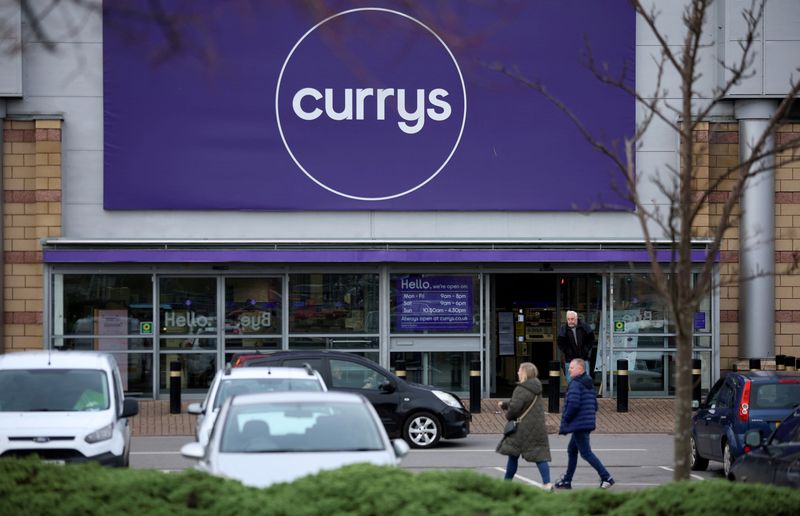By Amy-Jo Crowley and Andres Gonzalez
LONDON (Reuters) -The number of failed takeovers of UK-listed companies has more than doubled in recent years as boards have rebuffed a slew of bids they believe are taking advantage of cheapened stock prices.
Britain's Currys (LON:CURY) and Direct Line (LON:DLGD) in recent weeks are the latest example of companies that have rejected offers because their boards said they were too low.
Dealmakers have been hoping for a rebound in mergers and acquisitions this year after dealmaking in 2023 globally fell
to lows not seen since 2013. Private equity-led buyout volumes in particular globally slumped last year, as financial sponsors cut back on leveraged buyouts (LBOs) and sold fewer companies against a backdrop of higher financing costs and an uncertain economic outlook.
The share of takeover offers for UK-listed companies that were withdrawn between 2021-2023 was about 17%, versus 8% between 2014 and 2020, according to LSEG data.
UK takeover activity has also increased during that period as bidders zone in on the relative low valuations of the members of the FTSE 100 and FTSE 250.
Britain's FTSE 100 index has fallen 0.85% so far this year, versus a 4% gain for Europe's broad STOXX 600 index and a 7.5% gain for the S&P500 both of which are trading at all time highs. The FTSE 250 mid cap index is down around 2%.
"The proportion of possible takeover offers that were withdrawn in the last two years was elevated and something that drew attention in the market," said Stuart Ord, Co-Head of M&A at Deutsche Numis.
The trend underscores challenging financing conditions for buyers and a substantial gap in valuation expectations between buyers and sellers, leading to multiple rejections and "buyer frustration", Ord explained.
Typically investors can expect a premium of around 30% of a company's market capitalisation with a takeover offer but M&A specialists interviewed by Reuters said even much higher premia are being rebuffed.
"A 50% premium in today's market may not work for some companies, especially if the valuation is down versus historic norms," according to a UK M&A banker at a global investment bank, who declined to be identified.
In a latest offer, U.S.-based communications equipment firm Viavi Solutions Inc agreed to buy British telecommunications testing firm Spirent Communications (LON:SPT) for around 1.01 billion pounds ($1.28 billion), a premium of 61.4% to Spirent's closing price of 108.4 pence on March 4.
Buyers have also been hobbled by higher borrowing costs and limits to financing under UK takeover rules (which limit them going out to more than six potential bank lenders before a possible offer is made public).
The board of electrical goods group Currys last week rejected a improved offer of 67 pence a share in cash from US investor Elliott Advisors as it undervalued the company. That represented a premium of about 42% to Currys undisturbed share price.
Currys' largest shareholder Redwheel supported the board's rejection, while analysts at Peel Hunt (LON:PEEL) previously said it would struggle to see the Currys board engaging on anything less than 80 pence a share.
Insurance group Direct Line last week also announced it rejected an "unattractive" proposal from Belgium-listed rival Ageas.
In a period of higher borrowing costs and uncertain market conditions, some proposals were made public prematurely to put pressure on boards after private approaches were rejected or to involve more parties in financing, according to Claire Coppel, M&A partner at law firm Allen & Overy.
As soon as a potential offer is leaked and the bidder confirms its interest, it has 28 days to firm it up or walk away, according to "put up or shut up" (PUSU) UK takeover rules. That can make completing deals harder, bankers said.
Ord said the rule pressurises bidders to demonstrate to the target’s board or shareholders that it has a deliverable deal at an attractive value. "If you can't show that, or you try to and fail, then you are likely to walk away," he said.
Bidders instead are deploying new strategies such as the "private bear hug", where a spurned bidder takes its proposal direct to one or more of the leading shareholders and seeks their support with the target board, Ord said.

An expectation of falling interest rates and improved financing markets this year is unlikely to translate into frenetic deal activity.
"We expect more activity this year, and we have seen quite a lot of things start. But it takes more time to execute," said Eleanor Shanks, partner and head of International Private Equity at Herbert Smith Freehills.